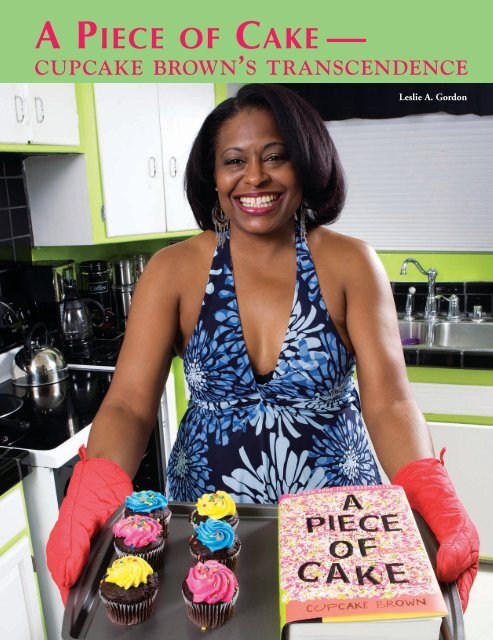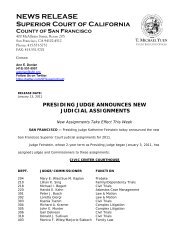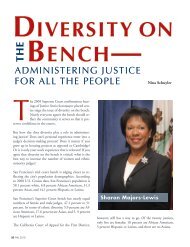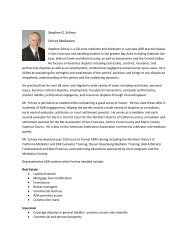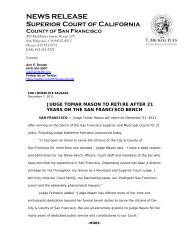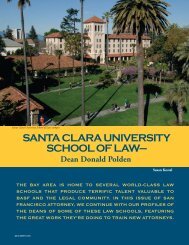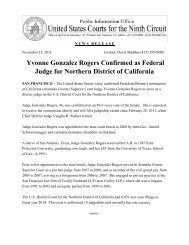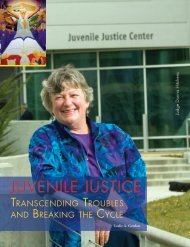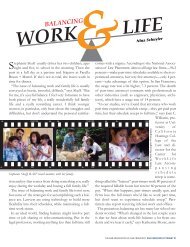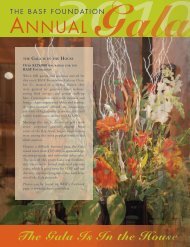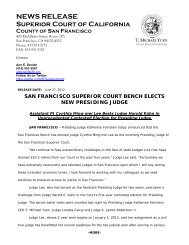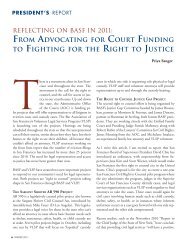Cupcake Brown's Transcendence - The Bar Association of San ...
Cupcake Brown's Transcendence - The Bar Association of San ...
Cupcake Brown's Transcendence - The Bar Association of San ...
You also want an ePaper? Increase the reach of your titles
YUMPU automatically turns print PDFs into web optimized ePapers that Google loves.
A PIECE OF CAKE —<br />
CUPCAKE BROWN’S TRANSCENDENCE<br />
Leslie A. Gordon
Not many lawyers are best-selling authors.<br />
And even fewer, if any, are former<br />
homeless crack addicts, prostitutes, or<br />
gang members. Yet <strong>Cupcake</strong> Brown is<br />
all those things and more.<br />
<strong>The</strong> triumphant story <strong>of</strong> Brown has been featured by<br />
everyone from Oprah Winfrey, who pr<strong>of</strong>iled her as a “phenomenal<br />
woman,” to CNN and National Public Radio.<br />
<strong>The</strong> story began when Brown’s mother died when <strong>Cupcake</strong><br />
(her real name, though she calls herself “Cup”) was<br />
eleven, and custody <strong>of</strong> Brown and her brother was<br />
awarded to her birth father, who knew the<br />
children only for their value in Social<br />
Security money. She was passed <strong>of</strong>f to<br />
an abusive foster mother who encouraged<br />
her nephew to rape Brown. Several<br />
years <strong>of</strong> street crime, prostitution, and<br />
drug addiction in <strong>San</strong> Diego followed, culminating<br />
with her living behind a dumpster.<br />
An unlikely series <strong>of</strong> events, chronicled in her memoir, A<br />
Piece <strong>of</strong> Cake, led Brown to <strong>San</strong> Diego State University,<br />
from which she graduated in 1998 magna cum laude despite<br />
her lack <strong>of</strong> a high school diploma or GED. That<br />
would have been triumph enough for most former crackaddict<br />
prostitutes. But Brown went on to graduate from<br />
the University <strong>of</strong> <strong>San</strong> Francisco School <strong>of</strong> Law in 2001,<br />
winning the school’s Judge Harold J. Haley Award for Exceptional<br />
Distinction in Scholarship, Character, and Activities.<br />
She was also admitted to the McAuliffe Honor<br />
Society and served as an extern to Justice Joyce Kennard <strong>of</strong><br />
the California Supreme Court.<br />
Brown then became a litigator at <strong>San</strong> Francisco’s Bingham<br />
McCutchen, specializing in antitrust, securities, corporate<br />
governance, and white-collar crime. Her favorite<br />
task, she says, was research and writing. “I love it. I’m in<br />
my element. And I enjoyed the partners I worked with,”<br />
she adds. “<strong>The</strong>y didn’t judge me. <strong>The</strong>y knew I was intelligent<br />
and capable. It was a great learning experience that I<br />
will take with me forever.”<br />
While launching a legal career that leaves most junior associates<br />
spent each day, Brown at the same time wrote her<br />
memoir, which became a best seller (reaching number one<br />
in the United Kingdom and number seventeen on the<br />
New York Times best-seller list) and a critical success. Reviews<br />
heralded Brown as a frank, resilient, gifted storyteller.<br />
According to the Washington Post, Brown’s book<br />
“dazzles [the reader] with the amazing change that is possible<br />
in one lifetime,” and the reviewer described it as “poetic<br />
in its simplicity.”<br />
David Balabanian, chair <strong>of</strong> Bingham’s litigation department,<br />
was a primary influence in encouraging Brown to<br />
write the book, giving her days <strong>of</strong>f periodically when<br />
an especially emotional chapter took its toll on<br />
Brown’s psyche. For that reason, the book<br />
took Brown two years to write and two<br />
years to edit. “After I wrote about rapes and<br />
beatings, I couldn’t go to work the next day,”<br />
she recalls. “So I had to put it down and come<br />
back to it.”<br />
Balabanian says what’s most affecting about<br />
Brown’s memoir is its positive tone. “She’s objective about<br />
the injustices, not self-pitying,” he says. “In some respects,<br />
she’s hard on herself. It wasn’t an unbroken trajectory from<br />
degradation to law school. <strong>The</strong>re were fits and starts. It<br />
reads, in many ways, like a book by Dickens.”<br />
<strong>The</strong> firm as a whole was “completely supportive <strong>of</strong> the<br />
book,” Brown adds. She is especially grateful for how<br />
everyone at the firm treated her with respect, despite her<br />
unorthodox past. “Law firms can be very hierarchical,” she<br />
explains. “But even when I was a first year, David [Balabanian]<br />
would refer to me as his ‘colleague.’” She suspects<br />
her history may have actually made her more approachable.<br />
“I can deal with any community, any pr<strong>of</strong>essional<br />
setting,” she says. “<strong>The</strong>re are all kinds <strong>of</strong> people in law<br />
firms, and a lot put on airs. But a lot <strong>of</strong> people feel comfortable<br />
with me.”<br />
Spurred on by Balabanian’s encouragement, Brown<br />
decided to write the book because <strong>of</strong> errors in stories about<br />
her by the media, which have followed her since her <strong>San</strong><br />
Diego State days. It began when one <strong>of</strong> her pr<strong>of</strong>essors<br />
there, who studied gangs, was interviewed by the local<br />
NBC news and mentioned Brown. “So the news team<br />
Photos by Jim Block<br />
THE BAR ASSOCIATION OF SAN FRANCISCO SAN FRANCISCO ATTORNEY 61
wanted to meet me. I was petrified. I wondered if I’d ever<br />
robbed anyone at NBC,” Brown quips. “When the story<br />
ran, the speaking requests started pouring in. Audience<br />
members had all these unanswered questions. <strong>The</strong> media<br />
started to follow me, and every news story had mistakes.”<br />
As her law firm career took <strong>of</strong>f, so did her motivational<br />
speaking career, which became<br />
even more demanding as A<br />
Piece <strong>of</strong> Cake gained attention.<br />
She was doing as many as<br />
three or four speeches a<br />
month, “always praying nothing<br />
would come up at work,”<br />
says Brown, who decided to<br />
leave law firm life this fall. “I<br />
want to help people,” she explains,<br />
“but litigation is not<br />
the kind <strong>of</strong> help I want to give.<br />
Bingham was a wonderful<br />
place, but firm life requires a<br />
lot. I’m not going back to a<br />
big firm. If I did, it would<br />
be Bingham.”<br />
<strong>The</strong> audiences at her speaking gigs are, Brown says, “as<br />
varied as my story.” Schools, churches, and even corporations<br />
looking to motivate employees hire her. She never<br />
uses a canned speech but instead tailors every presentation<br />
to the specific audience.<br />
“What’s endearing about her is her extraordinary good<br />
cheer,” Balabanian says. “Talking with her, you’d never<br />
think she’d had a down day in her life, let alone the hardships<br />
she experienced. For her to bounce back and not exhibit<br />
any bitterness or confront the world in a suspicious,<br />
guarded way is as remarkable as her other achievements.<br />
How is it possible for someone by sheer act <strong>of</strong> will to turn<br />
around her life? I have a hard time following<br />
my diet.”<br />
From left: David Balabanian, Bingham McCutchen; <strong>Cupcake</strong> Brown;<br />
and Judge Martin Jenkins, U.S. District Court, Northern District<br />
<strong>of</strong> California<br />
In addition to her speaking work, Brown is contemplating<br />
writing a sequel to the memoir focused specifically on<br />
her recovery, a how-to book <strong>of</strong> sorts. “I get a lot <strong>of</strong> e-mails<br />
that begin, ‘How did you . . . ?’” she explains.<br />
She’s also adapting A Piece <strong>of</strong> Cake into a script. It hasn’t<br />
yet been optioned by a studio, and she may actually try to<br />
make the film herself so she has<br />
more control. “I’m a realist,”<br />
Brown says about her foray into<br />
script-writing. “We all have different<br />
talents and we all have to<br />
try. If the script sucks, I’ve already<br />
won because I tried. It<br />
might be crap. I’ve never written<br />
one before. But in my motivational<br />
speaking, I encourage<br />
people to try [new things], and<br />
I want to practice what<br />
I preach.”<br />
Brown lives in <strong>San</strong> Leandro<br />
with her cat Squirt and spends<br />
“all [her] free time” with her<br />
boyfriend John, whom she met at church. <strong>The</strong>y are big<br />
movie buffs, heading to Blockbuster every Tuesday for new<br />
releases. Her favorite movies, she says, include While You<br />
Were Sleeping, Lady Sings the Blues, and anything with<br />
Doris Day.<br />
John Pernick, a Bingham litigation partner who worked<br />
with Brown, says he cannot remember being in a room<br />
with Brown and not smiling. “I would describe Cup as joyful,”<br />
he says. “Not only was she a joy to work with because<br />
<strong>of</strong> her intelligence and skills but she also just brought joy<br />
with her. Like everyone else who has worked with Cup, I<br />
have seen her attain success at everything she has worked<br />
on, from finding the right argument or case to helping a<br />
client to writing a best-selling book. So I am just interested<br />
in seeing what the next success is going to be.”<br />
62 WINTER 2007


